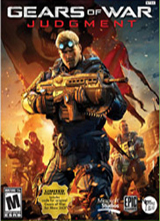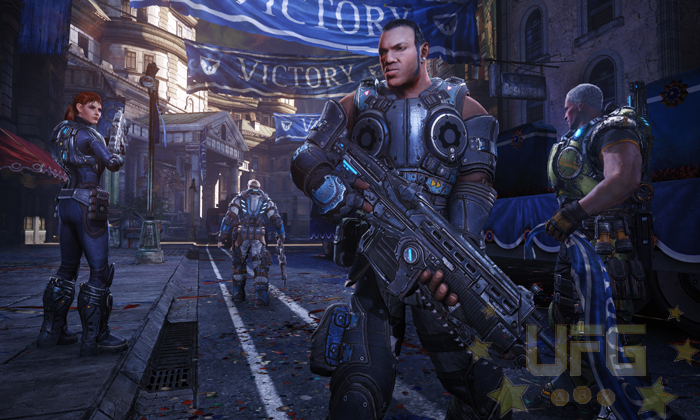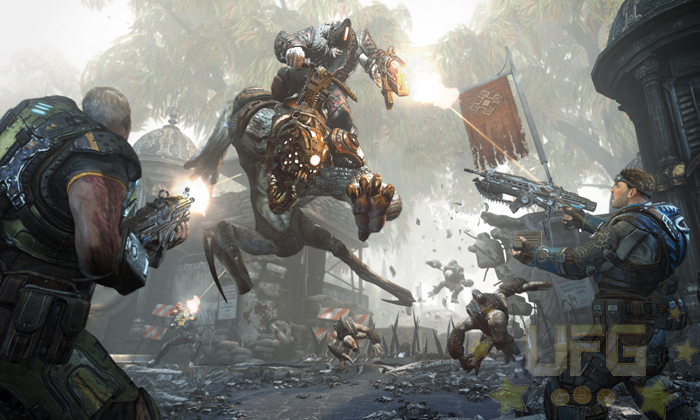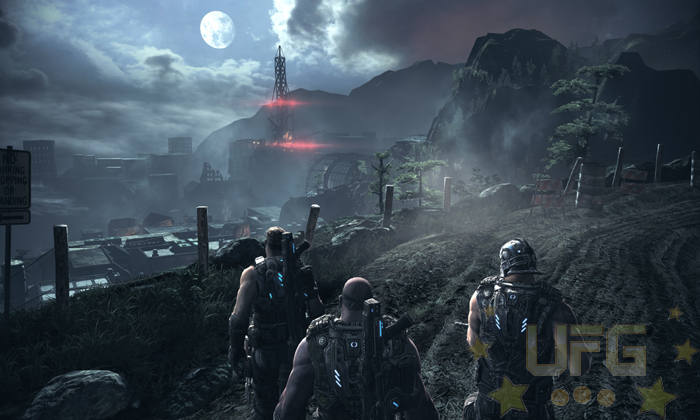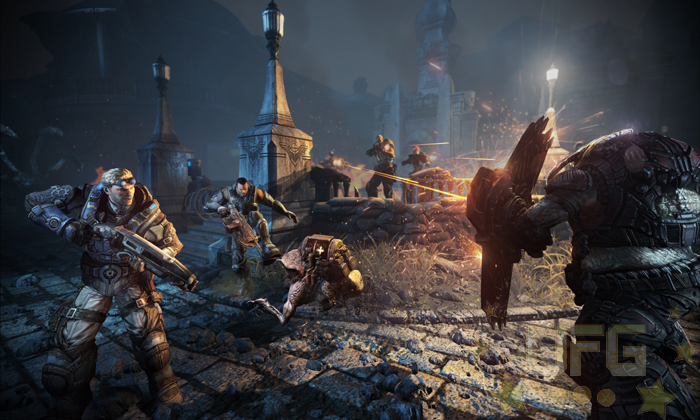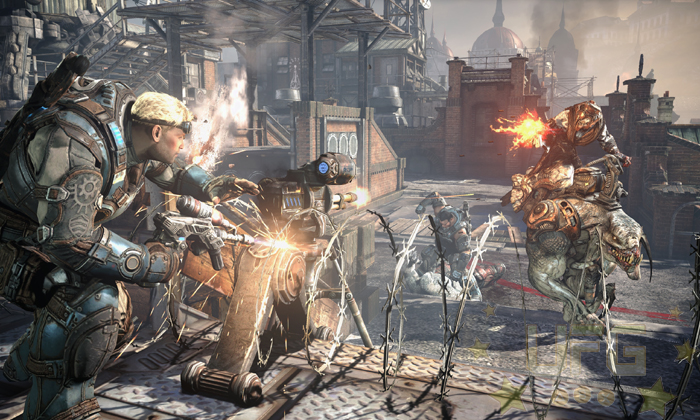Gears of War: Judgment
Gears of War is arguably one of the best franchises created during this generation of consoles. Not only did it set the bar for cover-based shooters, it also changed the idea of what a “survival” mode could be by creating a new staple, Horde mode, in action video games. Variations of Horde mode have found their way into many other titles. You’d be hard pressed to find a good cover-based shooter that doesn’t incorporate some of the mechanics pioneered by Epic in the Gears series. As cool as this all sounds, it doesn’t address how I personally feel about the series. The launch of a new Gears title almost always preceded a day off of work. And no matter how much the “host advantage” frustrated me during online matches, I still kept with it. Basically, I’m a fan through and through. Which is why I was so disappointed after playing though Gears of War: Judgment!
Judgment takes place before the first game in the series; before Baird and Cole met Marcus. Here we find a young Baird, Lieutenant of Kilo Squad, standing trail at a COG military tribunal. Apparently his unit disobeyed a direct order which lead to some displeasing events in the eyes of their commanding officer Ezra Loomis. Baird, Cole, and the other members of Kilo Squad take turns giving their testimony. The stakes are high because if Loomis doesn’t believe their actions were justified, he’ll have them executed. First up was Baird and…sigh, you know what? I can’t even pretend like the campaign was anything but a lackluster experience.
Like I said before, each character talks about their experiences leading up to the tribunal. But there really isn’t any anticipation or suspenseful building because we already know the outcome of the war. As the tale unfolds, we are treated to playable segments (flashbacks) that are narrated by the defendant. What each testimony boils down to is a boring account of the journey from point A to point B. Sure, you’ll shoot at things along the way and there are explosions, but none of it really matters. The sense of urgency is lost since the threat from the main antagonist, Karn, is referenced to but never truly experienced within the gameplay; Kilo Squad had to disobey orders in order to stop him but the developer does very little to sell this ominous character. Furthermore, at no point to do we get any insight into Baird’s or Cole’s background; how they became the men they are in the earlier Gears titles. This is a shame because I thought the whole point of a prequel was to shed new light on old characters. I mean, the final outcome of the trail isn’t a complete mystery seeing as how they are front and center in the later titles. So the only logical reason to have a prequel would be to give gamers new information about two somewhat popular characters. Unfortunately, we get none of that here. My thoughts quickly went from, “What were their orders and why did they disobey them,” to “what was the point of this prequel”!
The final blow to my enjoyment came in the actual gameplay. Again, each flashback is presented as an in-game chapter that is further broken down into short playable segments. At the end of each segment, you are scored based on your performance before moving on. On paper this sounds fine; older Gears titles had a segmented level design as well. This is usually done so that if you decide to stop playing before completing a level, the game would save in such a way that allowed you to continue play without having to restart the whole level. My problem here is that compared to the preceding titles, the segments in Judgment are extremely short. You’ll start at the beginning of a segment, fight some enemies, and then a few minutes later be greeted with a loading screen depicting your score. You’re basically clearing a room of enemies, stopping to look at your score, and then moving on to the next room. If you’ve been playing Gears for as long as I have, you’ll be flying through these sections in no time. Meaning you’ll be stopping a lot to look at a loading screen. The constant stopping makes the overall experience feel choppy and disjointed, as if I’m playing an arcade game lacking coherent story elements.
The silver lining…there are some good aspects of the campaign. Certain segments charged Kilo Squad with protecting an object or securing a place for transport. Gamers would have to defend themselves from waves of enemies using movable turrets, barricades, and more. These genuinely fun Horde Mode-like events did well to break up the run, clear, load, repeat gameplay. Another new element added in Judgment is the Declassified version of segments. Walking up to a red skull at a beginning of the level gives you the option of ramping up the difficulty. These optional triggers are similar to the skulls in Halo; they make the level more difficult to get through while allowing for an easier way of building up high scores. Keep in mind that these unpractical segments do not reflect what actually happened. They’re more like exaggerations; think of Baird saying “we fought off fifty Locust…using only a pistol with limited ammo”. The Declassifieds don’t really add much in terms of gameplay and most people will choose to activate them just for the score increase (which is how new skins and other modes are unlocked). Sounds superficial but their inclusion shows that People Can Fly is trying new things so kudos for that!
Bottom line, the lack of any real insight into the character’s back stories, the poor narrative in general, and the stop/go nature of play makes me feel like I’m just shooting things for the sake of shooting things. While not a bad thing entirely (sometimes I DO just want to shoot things), after such a great trilogy Epic should have known that fans of the series were going to want more than this. The Declassifieds and the Horde-like events don’t help as much as I’d like. As it stands, the main campaign feels like nothing more than overpriced DLC with a few gimmicks thrown in; RAAM’s Shadow offered more for my money than this. The good news is that there is more to this game than the main campaign. There is a secondary campaign, Aftermath, which is unlocked via the main campaign’s score system. This brief story takes place during the events of Gears of War 3. Here we get to see what happened to Baird, Cole, and Carmine after they were sent to find reinforcements for the assault on Azura. What’s great is that it feels more like the style of campaign fans are used to. There’s no scoring system, Declassifieds, or segmented gameplay. It’s just straight up Gears fun and way more exciting than the main campaign.
Alight, let’s stop picking on the campaign and take a look at the multiplayer options. As much as I wanted to like what Judgment offered, I just couldn’t enjoy myself. The changes made to the traditional Gears gameplay have turned this shooter into something else. The game restricts the starting weapons; only one main weapon is allowed to accompany a pistol at the start of a match. Active reloads are present but they only provide a power boost when playing the campaign, the sawed off can be shot twice before reloading, and any weapon can be used with a shield. The normal Team Deathmatch is back but you can only choose from GOG soldiers. There is no Execution mode*, because “down and out” is no longer a part of normal matches. In it’s place is a new Free-for-all mode. Then there are the controls. Throwing grenades is as simple as hitting a Bumper, the Y button switches between your two weapons, and….I’m just gonna stop there. What I’ve listed is enough to get my point across; that Judgment’s online gameplay is good but not Gears.
Only allowing one starting weapon has a positive effect. It forces people to think about the other available weapons as opposed relying solely on the Gnasher. Plus the new long range weapons offer more options for those who didn’t like using the classic armaments. At first this led to different strategies and overall, better gameplay. Now enter the gameplay breaking grenade mechanics! There is the new addition of the health grenade, which creates an area of active healing; the player who detonates it can stay in its healing range without sustain damage from an attack (unless it comes from a “one shot kills” weapon). Then there are some new twists on older grenades; like the frag grenade which will now automatically attach to people if it comes in contact with a body part after being thrown. Because of the ability to quickly throw a grenade with one button, you can no longer detect the type of grenade your opponent will use; they won’t have to actively switch to the grenade through a weapon slot, showing what grenade is being held as in previous titles. At least before, you could see what was about to be thrown your way and change your tactics accordingly. Now, well-thought out plans can go up in smoke due to am unexpected and lucky toss. Moreover, unlike the equalizing effect of the starting weapon restriction, all grenade types are available from the start of the match. Even though you can only have one type of grenade at time, the open access undermines the balance established by the weapon restriction. Sticky grenades in this type of game are cheap while Health grenades are, at times, down right broken! So…all of the strategies gamers would have come up with via the weapon restrictions are outdone by grenades.
Another wrinkle is the use of the shield. Previously using a shield forced you to switch to your sidearm but now you can use any weapon with it. No matter how good you are, going up against someone with a boomshot and the shield seems unfair. I guess these changes were implemented to allow newer players to be more of a threat online. However, this combination of “catering” with older elements of the game results in an overabundance of exploitation. The end result is a decent online shooter with balancing issues that ultimately, isn’t Gears. And while I can’t really negatively score the game based on how I think it should play (outside of the aforementioned broken mechanics), I have to stress how much fun I was not having.
I did enjoy my time with some of the new modes featured in Judgment though. While Free-for-all can be fun (mainly because it’s a completely different way of playing) it pales in comparison to the new Overrun mode. Overrun is a combination of the latest Horde and Beast modes from Gears of War 3, where one team plays as COGs and the other plays as Locusts. The COG is tasked with defending an area on a map while the Locusts try to destroy equipment that’s preventing them from making an emergence hole. If the COG stops the Locusts in their tracks, then they win the round and the teams switch sides (the COG team becomes Locusts and vice versa). If the Locusts succeed in overrunning an area, hence the title, then the map is reloaded with the COG being pushed back further into their camp. If this happens three times then the Locusts win the round. If both teams win during their time as the Locusts, then the winner is decided by whichever team did it the fastest.
To make things more interesting, People Can Fly added a class system. There are five COGs you can choose from and each has a different role on the battlefield. For example, Cole uses explosive weapons and supplies ammo to other players while Baird can lay down a turret and fix barricades. In order to be competitive, teams will need to take into account each character’s strengths and weaknesses. Sofia, one of the newer characters, is the only person who can revive a fallen character using health grenades. If a player picks her during a match, then the other players on the team receive the ability to go down after a certain amount of damage rather than dying. When it comes to the Locusts, the class system is more akin to how it was in Beast mode. Gamers will build up points by taking down defenses, killing COGs, etc. These points can be spent to buy different Locusts; more powerful creatures cost more points. Outside of that, each Locust still has a role to play. Basically, success comes down to team work and proper role management.
Overrun is the main reason to play Gears of War Judgment. Even though it has the most changes to the Gears formula than any other mode, it also presents the most entertainment. Working as a team to take down a Horde of human-controlled Locusts is great co-op fun and should be experienced at least once with a group of friends. That said, it is not worth the $60 price tag on its own. Even if you tack on the great Aftermath campaign, it doesn’t justify the money spent. The main campaign is a waste of time and the other competitive modes aren’t as good as the ones found in Gears 3. Throw in the fact that there are only four maps per competitive mode, most of the unlocks need to be purchased with real money, and you can see why I’d pass on this title; it’s light on worthwhile content for a fan of the series. Newcomers will certainly be able to look over most of my gripes; if they like the online play they’ll get over the weak campaign. Still, I would be remiss if I recommended a game I didn’t like because it may appeal to those new to the series!
Gameplay:
5
The campaign is only worth playing...to unlock Aftermath. The competitive modes work, but aren't very balanced. The saving grace is Overrun but with only four maps, it'll get old real fast!
Graphics:
9
Graphically everything looks great. I really liked the environments that were in the midst of “all hell breaking lose” as apposed to after everything went down.
Sound:
7
Not bad; nothing really noteworthy. That said, the dialog wasn't as compelling as previous titles (and that's saying something)!
What's New:
9
Just about everything was changed here. And while all the new elements aren't completely new to the genre, their combination with old Gears mechanics created something new. Whether or not you'll like it is another matter.
Replay Value:
4
Personally, I didn't want to keep playing...it hasn't even been a month yet. The lack of maps or a compelling story hurts any chances of me putting it back in my Xbox. Again, new comers may overlook the issues I saw and still enjoy the game. Take this score with a grain of salt.
Final Score:
6.8
